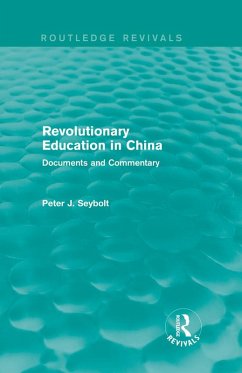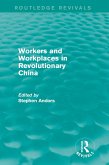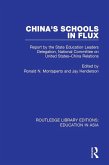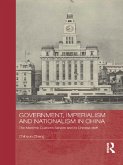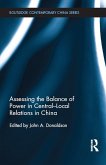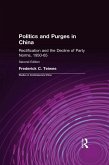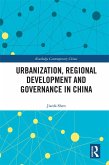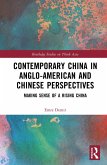38,95 €
38,95 €
inkl. MwSt.
Sofort per Download lieferbar

19 °P sammeln
38,95 €
Als Download kaufen

38,95 €
inkl. MwSt.
Sofort per Download lieferbar

19 °P sammeln
Jetzt verschenken
Alle Infos zum eBook verschenken
38,95 €
inkl. MwSt.
Sofort per Download lieferbar
Alle Infos zum eBook verschenken

19 °P sammeln
- Format: PDF
- Merkliste
- Auf die Merkliste
- Bewerten Bewerten
- Teilen
- Produkt teilen
- Produkterinnerung
- Produkterinnerung

Bitte loggen Sie sich zunächst in Ihr Kundenkonto ein oder registrieren Sie sich bei
bücher.de, um das eBook-Abo tolino select nutzen zu können.
Hier können Sie sich einloggen
Hier können Sie sich einloggen
Sie sind bereits eingeloggt. Klicken Sie auf 2. tolino select Abo, um fortzufahren.

Bitte loggen Sie sich zunächst in Ihr Kundenkonto ein oder registrieren Sie sich bei bücher.de, um das eBook-Abo tolino select nutzen zu können.
Originally published in 1973, this title analyses revolutionary changes in the Chinese education system and illustrates China's radical departure from both traditional and Western goals. This title is ideal for students interested in Asian Studies and History.
- Geräte: PC
- mit Kopierschutz
- eBook Hilfe
- Größe: 23.63MB
Andere Kunden interessierten sich auch für
![Workers and Workplaces in Revolutionary China (eBook, PDF) Workers and Workplaces in Revolutionary China (eBook, PDF)]() Workers and Workplaces in Revolutionary China (eBook, PDF)37,95 €
Workers and Workplaces in Revolutionary China (eBook, PDF)37,95 €![China's Schools in Flux (eBook, PDF) China's Schools in Flux (eBook, PDF)]() Ronald N. MontapertoChina's Schools in Flux (eBook, PDF)34,95 €
Ronald N. MontapertoChina's Schools in Flux (eBook, PDF)34,95 €![Government, Imperialism and Nationalism in China (eBook, PDF) Government, Imperialism and Nationalism in China (eBook, PDF)]() Chihyun ChangGovernment, Imperialism and Nationalism in China (eBook, PDF)52,95 €
Chihyun ChangGovernment, Imperialism and Nationalism in China (eBook, PDF)52,95 €![Assessing the Balance of Power in Central-Local Relations in China (eBook, PDF) Assessing the Balance of Power in Central-Local Relations in China (eBook, PDF)]() Assessing the Balance of Power in Central-Local Relations in China (eBook, PDF)49,95 €
Assessing the Balance of Power in Central-Local Relations in China (eBook, PDF)49,95 €![Politics and Purges in China (eBook, PDF) Politics and Purges in China (eBook, PDF)]() Frederick C TeiwesPolitics and Purges in China (eBook, PDF)43,95 €
Frederick C TeiwesPolitics and Purges in China (eBook, PDF)43,95 €![Urbanization, Regional Development and Governance in China (eBook, PDF) Urbanization, Regional Development and Governance in China (eBook, PDF)]() Jianfa ShenUrbanization, Regional Development and Governance in China (eBook, PDF)41,95 €
Jianfa ShenUrbanization, Regional Development and Governance in China (eBook, PDF)41,95 €![Contemporary China in Anglo-American and Chinese Perspectives (eBook, PDF) Contemporary China in Anglo-American and Chinese Perspectives (eBook, PDF)]() Emre DemirContemporary China in Anglo-American and Chinese Perspectives (eBook, PDF)37,95 €
Emre DemirContemporary China in Anglo-American and Chinese Perspectives (eBook, PDF)37,95 €-
-
-
Originally published in 1973, this title analyses revolutionary changes in the Chinese education system and illustrates China's radical departure from both traditional and Western goals. This title is ideal for students interested in Asian Studies and History.
Dieser Download kann aus rechtlichen Gründen nur mit Rechnungsadresse in A, B, BG, CY, CZ, D, DK, EW, E, FIN, F, GR, HR, H, IRL, I, LT, L, LR, M, NL, PL, P, R, S, SLO, SK ausgeliefert werden.
Produktdetails
- Produktdetails
- Verlag: Taylor & Francis
- Seitenzahl: 462
- Erscheinungstermin: 22. Dezember 2015
- Englisch
- ISBN-13: 9781317272342
- Artikelnr.: 44773284
- Verlag: Taylor & Francis
- Seitenzahl: 462
- Erscheinungstermin: 22. Dezember 2015
- Englisch
- ISBN-13: 9781317272342
- Artikelnr.: 44773284
- Herstellerkennzeichnung Die Herstellerinformationen sind derzeit nicht verfügbar.
Peter J. Seybolt
Introduction; Part I: History of the Struggle over Educational Policy; 1.
Chronology of the Two-Road Struggle on the Educational Front in the Past
Seventeen Years; Part II: General Directives; 2. Quotations from Chairman
Mao 3. Universities and Middle and Primary Schools Should All Resume
Classes and Make Revolution 4. Shorten the Period of Schooling and
Revolutionize Education 5. The Working Class must Exercize leadership in
Everything; Part III: Educating the Elites; 6. The 'May 7' Cadre School 7.
On the Reeducation of Intellectuals 8. Wholeheartedly Complete
'Reeducation' Work; Part IV: Control of the Schools; 9. Chairman Mao's
(March 7)Directive Concerning the Great Strategi Plan for the Great
Proletarian Cultural Revolution 10. Thoroughly Implement the Latest
Directive of our Great Leader Chairman Mao, and Firmly Execute the Battle
Orders Issued by the Proletarian Headquarters 11. School Management by Poor
and Lower-Middle Peasants as Shown by the Practice of Three Production
Brigades in the Educational Revolution 12. Consolidate the Leadership of
the Working Class Over the Educational Revolution; V. Teachers and Teaching
; 13. Taking a Joyous Step Forward in the Educational Revolution 14.
Strengthen the Building of the Ranks of Urban Primary and Middle School
Teachers 15. A 'Mobile University' for Training of Teachers with Greater,
Faster, Better, and More Economical Results; Part VI: Short-Term training
Classes; 16. Four New Kinds of Schools; VII: Elementary Education, Rural
Schools; 17. A Primary School Run by the People Under the Control of the
Poor and Lower-Middle Peasants 18. The Poor and Lower-Middle Peasants Have
Acquired Socialist Culture 19. A Network for Popularizing Socialist
Education; VIII: Middle Schools, Physical Ecuation; 20. A Middle School
Serving the Three Great Revolutionary Movements 21. How Did We Initiate
'Industrial Studies' Activities? 22. Mass Physical Training; Part IX:
Higher-Level Technical Training; 23. The Way to train Engineer and
Technical Personnel as Viewed from the Shanghai Machine-Tool Plant 24.
Strive to Build a Socialist University of Science and Engineering; Part X:
Liberal Arts Colleges; 25. Liberal Arts Universities Must Carry Out
Revolutionary Mass Criticism 26. Reform Liberal Arts Universities Through
Revolutionary Mass Criticism; Part XI: The Yenan Background; 27.
Educational Method at K'angsta 28. The Problem of Transforming General
Education in the Base Areas 29. On Regulations and Curriculum in General
Education 30. Border Region Government Directive on promoting the Study of
Model Schools and on Experimentation with Popular-Management Primary
Schools (April 18, 1944) 31. Regarding the New Curriculum for Middle
Schools 32. Yenan University Educational Policy and Temporary regulations
(May 21, 1944); Appendix; Biographical Guide; Glossary
Chronology of the Two-Road Struggle on the Educational Front in the Past
Seventeen Years; Part II: General Directives; 2. Quotations from Chairman
Mao 3. Universities and Middle and Primary Schools Should All Resume
Classes and Make Revolution 4. Shorten the Period of Schooling and
Revolutionize Education 5. The Working Class must Exercize leadership in
Everything; Part III: Educating the Elites; 6. The 'May 7' Cadre School 7.
On the Reeducation of Intellectuals 8. Wholeheartedly Complete
'Reeducation' Work; Part IV: Control of the Schools; 9. Chairman Mao's
(March 7)Directive Concerning the Great Strategi Plan for the Great
Proletarian Cultural Revolution 10. Thoroughly Implement the Latest
Directive of our Great Leader Chairman Mao, and Firmly Execute the Battle
Orders Issued by the Proletarian Headquarters 11. School Management by Poor
and Lower-Middle Peasants as Shown by the Practice of Three Production
Brigades in the Educational Revolution 12. Consolidate the Leadership of
the Working Class Over the Educational Revolution; V. Teachers and Teaching
; 13. Taking a Joyous Step Forward in the Educational Revolution 14.
Strengthen the Building of the Ranks of Urban Primary and Middle School
Teachers 15. A 'Mobile University' for Training of Teachers with Greater,
Faster, Better, and More Economical Results; Part VI: Short-Term training
Classes; 16. Four New Kinds of Schools; VII: Elementary Education, Rural
Schools; 17. A Primary School Run by the People Under the Control of the
Poor and Lower-Middle Peasants 18. The Poor and Lower-Middle Peasants Have
Acquired Socialist Culture 19. A Network for Popularizing Socialist
Education; VIII: Middle Schools, Physical Ecuation; 20. A Middle School
Serving the Three Great Revolutionary Movements 21. How Did We Initiate
'Industrial Studies' Activities? 22. Mass Physical Training; Part IX:
Higher-Level Technical Training; 23. The Way to train Engineer and
Technical Personnel as Viewed from the Shanghai Machine-Tool Plant 24.
Strive to Build a Socialist University of Science and Engineering; Part X:
Liberal Arts Colleges; 25. Liberal Arts Universities Must Carry Out
Revolutionary Mass Criticism 26. Reform Liberal Arts Universities Through
Revolutionary Mass Criticism; Part XI: The Yenan Background; 27.
Educational Method at K'angsta 28. The Problem of Transforming General
Education in the Base Areas 29. On Regulations and Curriculum in General
Education 30. Border Region Government Directive on promoting the Study of
Model Schools and on Experimentation with Popular-Management Primary
Schools (April 18, 1944) 31. Regarding the New Curriculum for Middle
Schools 32. Yenan University Educational Policy and Temporary regulations
(May 21, 1944); Appendix; Biographical Guide; Glossary
Introduction; Part I: History of the Struggle over Educational Policy; 1.
Chronology of the Two-Road Struggle on the Educational Front in the Past
Seventeen Years; Part II: General Directives; 2. Quotations from Chairman
Mao 3. Universities and Middle and Primary Schools Should All Resume
Classes and Make Revolution 4. Shorten the Period of Schooling and
Revolutionize Education 5. The Working Class must Exercize leadership in
Everything; Part III: Educating the Elites; 6. The 'May 7' Cadre School 7.
On the Reeducation of Intellectuals 8. Wholeheartedly Complete
'Reeducation' Work; Part IV: Control of the Schools; 9. Chairman Mao's
(March 7)Directive Concerning the Great Strategi Plan for the Great
Proletarian Cultural Revolution 10. Thoroughly Implement the Latest
Directive of our Great Leader Chairman Mao, and Firmly Execute the Battle
Orders Issued by the Proletarian Headquarters 11. School Management by Poor
and Lower-Middle Peasants as Shown by the Practice of Three Production
Brigades in the Educational Revolution 12. Consolidate the Leadership of
the Working Class Over the Educational Revolution; V. Teachers and Teaching
; 13. Taking a Joyous Step Forward in the Educational Revolution 14.
Strengthen the Building of the Ranks of Urban Primary and Middle School
Teachers 15. A 'Mobile University' for Training of Teachers with Greater,
Faster, Better, and More Economical Results; Part VI: Short-Term training
Classes; 16. Four New Kinds of Schools; VII: Elementary Education, Rural
Schools; 17. A Primary School Run by the People Under the Control of the
Poor and Lower-Middle Peasants 18. The Poor and Lower-Middle Peasants Have
Acquired Socialist Culture 19. A Network for Popularizing Socialist
Education; VIII: Middle Schools, Physical Ecuation; 20. A Middle School
Serving the Three Great Revolutionary Movements 21. How Did We Initiate
'Industrial Studies' Activities? 22. Mass Physical Training; Part IX:
Higher-Level Technical Training; 23. The Way to train Engineer and
Technical Personnel as Viewed from the Shanghai Machine-Tool Plant 24.
Strive to Build a Socialist University of Science and Engineering; Part X:
Liberal Arts Colleges; 25. Liberal Arts Universities Must Carry Out
Revolutionary Mass Criticism 26. Reform Liberal Arts Universities Through
Revolutionary Mass Criticism; Part XI: The Yenan Background; 27.
Educational Method at K'angsta 28. The Problem of Transforming General
Education in the Base Areas 29. On Regulations and Curriculum in General
Education 30. Border Region Government Directive on promoting the Study of
Model Schools and on Experimentation with Popular-Management Primary
Schools (April 18, 1944) 31. Regarding the New Curriculum for Middle
Schools 32. Yenan University Educational Policy and Temporary regulations
(May 21, 1944); Appendix; Biographical Guide; Glossary
Chronology of the Two-Road Struggle on the Educational Front in the Past
Seventeen Years; Part II: General Directives; 2. Quotations from Chairman
Mao 3. Universities and Middle and Primary Schools Should All Resume
Classes and Make Revolution 4. Shorten the Period of Schooling and
Revolutionize Education 5. The Working Class must Exercize leadership in
Everything; Part III: Educating the Elites; 6. The 'May 7' Cadre School 7.
On the Reeducation of Intellectuals 8. Wholeheartedly Complete
'Reeducation' Work; Part IV: Control of the Schools; 9. Chairman Mao's
(March 7)Directive Concerning the Great Strategi Plan for the Great
Proletarian Cultural Revolution 10. Thoroughly Implement the Latest
Directive of our Great Leader Chairman Mao, and Firmly Execute the Battle
Orders Issued by the Proletarian Headquarters 11. School Management by Poor
and Lower-Middle Peasants as Shown by the Practice of Three Production
Brigades in the Educational Revolution 12. Consolidate the Leadership of
the Working Class Over the Educational Revolution; V. Teachers and Teaching
; 13. Taking a Joyous Step Forward in the Educational Revolution 14.
Strengthen the Building of the Ranks of Urban Primary and Middle School
Teachers 15. A 'Mobile University' for Training of Teachers with Greater,
Faster, Better, and More Economical Results; Part VI: Short-Term training
Classes; 16. Four New Kinds of Schools; VII: Elementary Education, Rural
Schools; 17. A Primary School Run by the People Under the Control of the
Poor and Lower-Middle Peasants 18. The Poor and Lower-Middle Peasants Have
Acquired Socialist Culture 19. A Network for Popularizing Socialist
Education; VIII: Middle Schools, Physical Ecuation; 20. A Middle School
Serving the Three Great Revolutionary Movements 21. How Did We Initiate
'Industrial Studies' Activities? 22. Mass Physical Training; Part IX:
Higher-Level Technical Training; 23. The Way to train Engineer and
Technical Personnel as Viewed from the Shanghai Machine-Tool Plant 24.
Strive to Build a Socialist University of Science and Engineering; Part X:
Liberal Arts Colleges; 25. Liberal Arts Universities Must Carry Out
Revolutionary Mass Criticism 26. Reform Liberal Arts Universities Through
Revolutionary Mass Criticism; Part XI: The Yenan Background; 27.
Educational Method at K'angsta 28. The Problem of Transforming General
Education in the Base Areas 29. On Regulations and Curriculum in General
Education 30. Border Region Government Directive on promoting the Study of
Model Schools and on Experimentation with Popular-Management Primary
Schools (April 18, 1944) 31. Regarding the New Curriculum for Middle
Schools 32. Yenan University Educational Policy and Temporary regulations
(May 21, 1944); Appendix; Biographical Guide; Glossary
